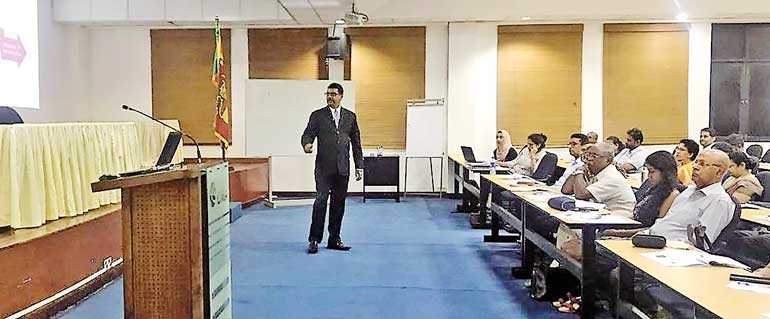Thursday Feb 19, 2026
Thursday Feb 19, 2026
Thursday, 27 September 2018 00:00 - - {{hitsCtrl.values.hits}}

A CIMA seminar on ‘Recent Developments in Taxation’ was held on 19 September. Suresh Perera, LLB, Attorney at Law, FCMA (UK), CGMA delivered his presentation focusing on the Finance Bill, VAT and NBT Amendments and recently issued gazettes and circulars under the new Inland Revenue Act.
Speaking on the Debt Repayment Levy (DRL) to be implemented under the finance act, during the period 2002 to 2011, Perera mentioned that a ‘Debit Tax’ was levied at the rate of 0.1% on the total debits of current and savings account per month along with encashment of Certificate of Deposits and travellers’ cheques. 
He added: “In the Budget 2017, a Financial Transaction Levy was proposed at the rate of 0.05% on total cash transaction, including easy cash. However this was never implemented. Subsequently in Budget Proposals for 2018 presented in Parliament in November 2017, a Debt Repayment Levy of 0.2% was proposed on the total cash transaction of financial institutions. The new Debt Repayment Levy couched in the Finance Bill in fact is a modification to the Debt Repayment Levy proposed in the Budget Proposals for 2018.”
The Debt Repayment Levy is a monthly levy imposed on every financial institution computed to the value addition attributable to the supply of financial services calculated in terms of Section 25C (4) of the Value Added Tax Act at the rate of 7%. The effective date of this levy is the date of commencement of the Finance Act and is due on or before the 15th day of the succeeding month.

Perera also pointed out that a financial institutions liable to pay the DRL extends to finance companies in addition to licensed commercial and specialised banks. However in the definition of a financial institution the reference is made to “a finance company registered under the Finance Companies Act, No. 78 of 1988”. Section 71 of the Finance Business No. 42 of 2011 has repealed the old Finance Companies Act, No. 78 of 1988, hence it is no longer applicable from 2011.
Due to the loophole in the Bill, it can be inferred that finance companies registered under the Finance Business No. 42 of 2011 will not subject to the levy unless the loophole in the Bill is closed prior to the passing of the Finance Act.